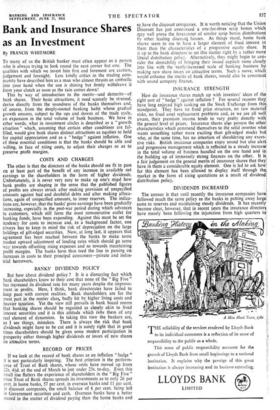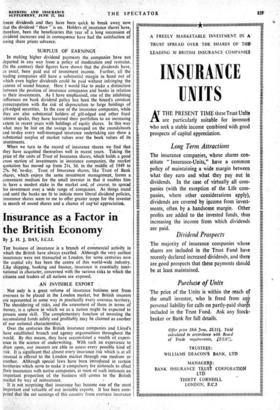Bank and Insurance Shares as an Investment
By FRANCIS WHITMORE To many of us the British banker must often appear as a person who is always trying to look round the next corner but one. The qualities with which we invest him first and foremost are caution, judgement and foresight. Less kindly critics in the trading com- munity have described him as a man who almost thrusts an umbrella into your hand when the sun is shining but firmly withdraws it from your clutch as soon as the rain conies down!
This by way of introduction to the merits—and demerits—of bank shares. Their basic attractions, it need scarcely be stressed, derive directly from the soundness of the banks themselves and, of course, from the deeply-rooted banking habit whose gradual growth ensures, subject to the ups and downs of the trade cycle, an expansion in the total volume of bank business. We have in other words, what in investment circles is described as a " growth situation " which, assuming that certain other conditions are ful- filled, would give bank shares distinct attractions as equities to hold for capital appreciation and as a " hedge " against inflation. One of these essential conditions is that the banks should be able and willing, in face of.rising costs, to adjust their charges so as to preserve profit margins.
COSTS AND CHARGES The other is that the directors of the banks should see fit to pass on at least part of the benefit of any increase in available net earnings to the shareholders in the form of higher dividends. Unfortunately, it is never very easy to make up one's mind how bank profits are shaping in the sense that the published figures of profits are always struck after making provision of unspecified amounts against bad and doubtful debts and after making alloca- tions, again of unspecified amounts, to inner reserves. The indica- tions are, however, that the banks' gross earnings have been gradually increasing, especially in the post-war period during which advances to customers, which still form the most remunerative outlet for banking funds, have been expanding. Against this must be set the tendency for costs to increase and, as a background" factor, one always has to keep in mind the risk of depreciation on the large holdings of gilt-edged securities. Now, at long last, it appears that agreement has been reached between the banks to make some modest upward adjustment of lending rates which should go some way towards offsetting rising expenses and so towards maintaining profit margins. The banks have thus toed the line in passing on increases in costs to their principal consumers—private and indus- trial borrowers.
BANKS' DIVIDEND POLICY
But how about dividend policy ? It is a dismaying fact which bank shareholders know to their cost that none of the " Big Five " has increased its dividend rate for many years despite the improve- ment in profits. Here, I think, bank directorates have failed to keep pace with current realities. Bank shareholders are for the most part in the rentier clan, badly hit by higher living costs and heavier taxation. Yet the view still prevails in bank board rooms that banking shares should be regarded as closely akin to fixed interest securities and it is this attitude which robs them of any real element of dynamism. In taking this view the bankers are, as I see things, mistaken. There is always the risk that bank dividends might have to be cut and it is surely right that in good times shareholders should be given some modest participation in prosperity either through higher dividends or issues of new shares en attractive terms.
RECORD OF PRICES
If we look at the record of bank shares as an inflation " hedge " it is not particularly inspiring. The best criterion is the perform- ance of Trust of Bank shares, whose units have moved up from 22s. 41d. at the end of March to just under 23s. to-day. Even this small rise flatters the experience of shareholders in the " Big Five " since Trust of Bank shares spreads its investments as to only 26 per cent. in home banks, 57 per cent. in overseas banks and 11 per cent. in discount companies, the small balance of 6 per cent. being left in Government securities and cash. Overseas banks have a better record in the matter of dividend paying than the home banks and so have the discount companies. It is worth noticing that the Union Discount has just announced a one-for-three scrip bonus which rpay well prove the forerunner of similar scrip bonus distributionS by other leading discount houses. As things stand, home bank shares seem to me to have a larger element of fixed interest in them than the characteristics of a progressive equity share. It is up to the bank directors to set this matter right by a rather more liberal distribution policy. Alternatively, they might begin to con; sider the desirability of bringing their issued capitals more closely into line with the vastly-increased scale of banking business by making new share issues on attractive terms. Such a move, which would enhance the merits of bank shares, would also be consistenti with sound company finance.
INSURANCE STRENGTH
How do insurance shares match up with investors' ideas of thei right sort of " hedge " against inflation ? For several reasons they have long enjoyed high ranking on the Stock Exchange from this! standpoint. They have no fixed price structure, no raw material;' risks, no fixed asset replacement problems and, as we are all well; aware, their premium income tends to vary pretty directly with the general level of prices. Insurance shares also possess the other! characteristics which commend themselves to the solid investor who wants something rather more exciting than gilt-edged stocks but who, at the same time, has no intention of shouldering any exceS-! sive risks. British insurance companies enjoy sound but also alert! and progressive management which is reflected in a steady increase! in the total volume of business handled on the one hand and MI the building up of immensely strong finances on the other. It isi a fair judgement on the general merits of insurance shares that they have in them a considerable equity element. One is led to ask how: far this element has been allowed to display itself through the market in the form of rising quotations as a result of dividend; distribution policy.
DIVIDENDS INCREASED
The answer is that until recently the insurance companies have; followed much the same policy as the banks in putting away large; sums to reserves and maintaining steady dividends. It has recently become clear, however, that in recent years the insurance director have merely been following the injunction from high quarters to'
freeze dividends and they have been quick to break away, now that the dividend " thaw " is on. Holders of insurance shares have, therefore, been the beneficiaries this year of a long succession of dividend increases and in consequence have had the satisfaction of seeing share prices advance.
SURPLUS OF EARNINGS
In making higher dividend payments the companies have not departed in any way from a policy of moderation and restraint. On the contrary their figures have shown that the dividends have, as usual, been paid out of investment income. Further, all the leading companies still have a substantial margin in hand out of which even higher dividends could be paid without infringing the canons of sound finance. Here I would like to make a distinction between the position of insurance companies and banks in relation to their investments. As I have emphasised, one of the inhibiting influences on bank dividend policy has been the board's constant preoccupation with the risk of depreciation to large holdings of gilt-edged securities. In the case of the insurance companies, while they are also substantial holders of gilt-edged and other fixed interest stocks, they have leavened their portfolios to an increasing extent in recent years with holdings of equity shares. In this way what may be lost on the swings is recouped on the roundabouts and to-day every well-managed insurance undertaking can show a substantial surplus of market values over the book values of its investments.
When we turn to the record of insurance shares we find that they have acquitted themselves well in recent years. Taking the price of the units of Trust of Insurance shares, which holds a good cross section of investments in insurance companies, the market quotation has moved up from 21s. 3d. in the middle of 1949 to 25s. 9d. 'to-day. Trust of Insurance shares, like Trust of Bank shares, which enjoys the same investment management, forms a convenient medium for the small investor in that it enables him to have a modest stake in the market and, of course, to spread his investment over a wide range of companies. As things stand and until the banks see fit to initiate more liberal dividend policies, insurance shares seem to me to offer greater scope for the investor in search of sound shares and a chance of capital appreciation.



















































 Previous page
Previous page